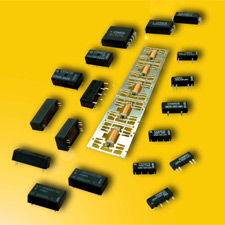Comus Europe Ltd
Reed Relays

Reed relays consist of a reed switch and coil assembled into a housing, which could be plastic, metal or molded. The reed switches consist of two or three ferro-magnetic blades, which are hermetically sealed in an inert atmosphere within a glass tube, preventing the ingress of contaminants. It also minimizes arcing and contact damage. Compared with electro-mechanical relays, reed relays are smaller in size and generally have a faster response time, lower power consumption and longer life. They can also directly be driven by TTL/CMOS. Compared with solid state relays, reed relays have a real galvanic isolation between input and output. The leakage current and the ON-resistance is much lower. Reed relays also can offer a higher dielectric strength.
Operation
Reed relays have outstanding performance in insulation and stand-off voltage. Energizing the coil operates a reed switch, causing the contacts to close, to open or to change over. It is important that the switch is not overloaded by applying loads in excess of the switch ratings. For details on switch loads refer to the reed relay specifications in the technical table or on specific data sheets.
Washabilit
Resistant to most of the common cleaning fluids. During the final rinsing phase only the purest substances should be used.
Pull-in and Drop-out voltage, Coil resistance
The tolerances indicated are valid at 25°C+/- 3°C. The temperature coefficient of the coil resistance is 0.4%/°C.
Vibration and shock resistance
During the evaluation of vibration and shock resistance, the relays are driven with nominal voltage. The switches should not open longer than 10 µsec.
Switching Voltage, Current and capacity
The parameters as listed for switching voltage, current and capacity are maximum values. Exceeding any one of these values causes overload and reduces relay life expectancy.
Contact resistance
The contact resistance indicated is valid for new relays at nominal coil voltage. The four-point method at 2Vdc/100mA or 10mA is applied. Custom solutions for special applications, especially for switching signals smaller than 1 mV and 10 µA (low level applications) or applications requiring dynamic contact resistance measurement can be produced for special switching needs.
Click here for more Product Details from
Comus Europe Ltd...